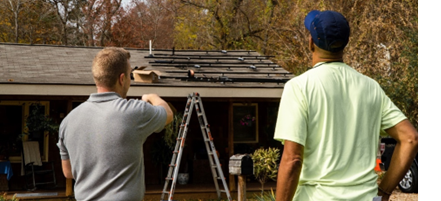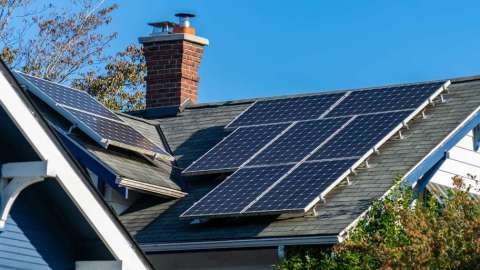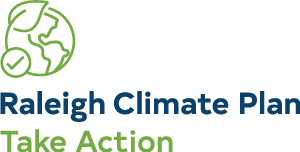
Data on this page is updated annually.
One of the best ways to reduce greenhouse gas emissions across North Carolina is “greening” our energy supply grid, transitioning away from high-polluting coal and natural gas to cleaner renewable sources like solar, wind, and geothermal energy. The most viable renewable energy sources in Raleigh and the region are solar and geothermal. Diversifying our sources of energy not only ensures a more consistent and clean energy supply for our community but also helps community members be more resilient to power outages during severe weather or other emergency events and to save money on rising energy costs over time. Solar can go on homes, businesses, City buildings, and open land to contribute to electricity generation in North Carolina.
How is Solar Energy Generated?
Solar cells capture light energy from the sun and turn it into energy that can power our homes and businesses without releasing harmful GHG emissions. A solar panel is a packaged, connected assembly of photovoltaic (PV) solar cells. Solar panels are often put on the rooftop of a home or business. Larger amounts of solar panels can be installed in open spaces like a solar “farm” field or solar canopies used to generate electricity and to provide shade in a parking lot. Since the first solar panel was created in 1954, the industry has made incredible developments in improving the efficiency and durability of solar technology. The growth of battery storage has allowed for solar installations to increasingly meet the energy needs of homes, businesses, and communities. When the sun is not shining, batteries allow the storage and use of electricity from the solar panels.
The below chart from North Carolina Sustainable Energy Association shows how solar has risen throughout the state, especially in the Triangle area!
The Growth of Solar in Raleigh
Raleigh is a state leader in solar for North Carolina, which as of 2024 is #4 in installed solar capacity nationally. The City of Raleigh has a long history of supporting renewable energy, installing it at many facilities. In 2022, Raleigh City Council approved $2 million in American Rescue Plan (ARPA) funds to be used for the evaluation and installation of various solar projects across the City, ranging from solar installations on City facilities and other solar technologies. Staff will implement these projects over the course of the next few years.
The City of Raleigh has also created programs to help the Raleigh community access more solar by creating a partnership across the Triangle for group purchasing of solar and battery storage. In the Solarize the Triangle program, Raleigh worked with over 15 community partners to create this award-winning program that broke national records for the most community members across the country signing up for solar evaluations. This program also includes a low to middle income (LMI) solar program where the city is working with many community partners to identify and install solar on LMI homes to help community members access solar. These participants are some of the community members who could benefit the most from lower energy costs and clean energy.
The City also developed a pilot program with the goal of increasing access to clean and affordable solar energy for low-income households. Energy burden is an increasingly concerning issue, and reducing the cost of utility bills can make all the difference in people being able to afford to stay in their homes. The program involved an incentive for affordable housing developers to install solar using City funding. Although in 2024 no affordable housing developers applied for the incentive, the City is exploring new ways to increase solar access especially for those most in need of lower energy bills.
In addition, Raleigh achieved the SolSmart Silver designation in 2022. The Office of Sustainability and Planning and Development Department partnered to lead City departments and community stakeholders in a process to update the permitting procedures for residential and commercial solar energy installations. This makes it easier and faster to receive solar installation permits. They updated other resources to promote solar growth in Raleigh as well. The SolSmart program certifies cities that: address local community barriers to solar energy, develop innovative solutions to promote solar installation, and educate and engage community members on the benefits of solar energy. The City is currently working on the Gold Designation.
All of these initiatives and more are designed to accelerate the pace of solar installations across the community. As of 2024, there were more than 1,500 solar installations in Raleigh. The total installed capacity of these systems is about 40 megawatts (MW). That is enough electricity to power more than 3,000 detached houses or more than 8,000 apartments annually. This data below shows the cumulative capacity of installed solar in Raleigh over the past decade. Notably you will see the significant increase in residential solar installations since 2018.
The Basics of Solar Installation
There are several considerations to installing renewable energy on your home or business. To generate enough electricity to offset energy for a residential home, solar systems are typically made up of 10-30 solar panels installed on the roof or nearby on racks. The solar panels need to be oriented correctly so they can maximize the amount of sun they get, and the panels should also be clear from shading from nearby trees or buildings. Typically, south-facing roofs allow for the most solar energy generation, but solar can still work in other configurations.
A 2022 North Carolina Sustainable Energy Survey found that 97% of respondents, NC residents who installed solar at their homes, saw a decrease in their energy bills. Residential systems do involve an upfront installation cost, with savings coming in later years. Though there have been some rebates and incentives available for solar, residents must pay upfront costs to get solar panels installed in order to save on their energy bills over time. The majority of Raleigh residents get their electricity from Duke Energy. Residents can further save on solar through a billing system called net energy metering in which Duke Energy credits customers for the excess solar energy they generate and send to the electricity grid.

Interested in Solar?
Are you interested in installing solar at your home or small business? Solar has many financial and environmental benefits, and it is critical that you pick a reputable installer. Look for installers with the North American Board of Certified Energy Practitioners (NABCEP) certification. You can also look at installers that have signed North Carolina Sustainable Energy Association’s Solar Business Code.
Please explore the pages below for more information.
- Residential Solar Photovoltaic (PV) System. This page will walk you though, step by step, the quick and easy process for getting a City of Raleigh permit for a system for your home.
- Commercial Solar Photovoltaic (PV) System. This page will walk you though, step by step, the quick and easy process for getting a City of Raleigh permit for a solar system for retail, office, and other commercial buildings.
- North Carolina Sustainable Energy Association - Consumer Guide to Solar Electricity for the North Carolina Homeowner
Geothermal
Geothermal energy is another source of renewable energy that is viable in Raleigh. The new City of Raleigh LEED Gold Certified Law Enforcement Training Center continues to expand the City’s renewable energy portfolio by including over 80 geothermal wells for heating and cooling. Other examples of City facilities utilizing geothermal include: Wilders Grove Solid Waste Services facility with 60 wells and the GoRaleigh Transit Facility with 150 wells! Although geothermal well numbers for building vary, these facilities have many more wells than a typical home.
Geothermal energy can be used to cool and warm buildings by exchanging temperatures between just below the ground and inside buildings. In the summer, the ground temperature is typically cooler than the temperature in buildings. In the winter, the ground temperature is typically warmer than the temperature in buildings. Geothermal energy is renewable and produces less pollution and greenhouse gas emissions that burning fossil fuels.
To learn more about renewable energy in Raleigh, read the 2024 Community Climate Action Plan (CCAP) Implementation Report here.
